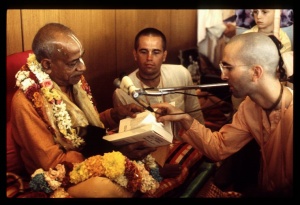CC Adi 7.6 (1975)

A.C. Bhaktivedanta Swami Prabhupada
TEXT 6
- pañca-tattvātmakaṁ kṛṣṇaṁ
- bhakta-rūpa-svarūpakam
- bhaktāvatāraṁ bhaktākhyaṁ
- namāmi bhakta-śaktikam
SYNONYMS
pañca-tattva-ātmakam—comprehending the five transcendental subject matters; kṛṣṇam—unto Lord Kṛṣṇa; bhakta-rūpa—in the form of a devotee; svarūpakam—in the expansion of a devotee; bhakta-avatāram—in the incarnation of a devotee; bhakta-ākhyam—known as a devotee; namāmi—I offer my obeisances; bhakta-śaktikam—the energy of the Supreme Personality of Godhead.
TRANSLATION
Let me offer my obeisances unto Lord Śrī Kṛṣṇa, who has manifested Himself in five as a devotee, expansion of a devotee, incarnation of a devotee, pure devotee and devotional energy.
PURPORT
Śrī Nityānanda Prabhu is the immediate expansion of Śrī Caitanya Mahāprabhu as His brother. He is the personified spiritual bliss of sac-cid-ānanda-vigraha. His body is transcendental and full of ecstasy in devotional service. Śrī Caitanya Mahāprabhu is therefore called bhakta-rūpa (the form of a devotee), and Śrī Nityānanda Prabhu is called bhakta-svarūpa (the expansion of a devotee). Śrī Advaita Prabhu, the incarnation of a devotee, is viṣṇu-tattva and belongs to the same category. There are also different types of bhaktas, or devotees, on the platforms of neutrality, servitude, friendship, parenthood and conjugal love. Devotees like Śrī Dāmodara, Śrī Gadādhara and Śrī Rāmānanda are different energies. This confirms the Vedic sūtra parāsya śaktir vividhaiva śrūyate. All these bhakta subjects taken together constitute Śrī Caitanya Mahāprabhu, who is Kṛṣṇa Himself.